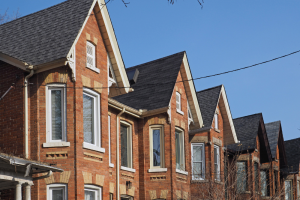How Does Being in a Property Chain Affect Me?
They say that life’s only constants are death and taxes. But for many, being tangled up in a property chain seems inescapable when buying or selling a home.
Home Emergency Insurance for £130
- ✓ Covered up to £1,000 per emergency
- ✓ £250 for overnight accomodation
- ✓ Call out, labour & parts included
Property chains have the ability to delay – and even collapse – a house purchase, leaving both buyers and sellers feeling extremely frustrated.
If you’re in the process of buying a new home, whether you’re just looking, have made an offer, or had an offer accepted, you’re probably wondering how a property chain might affect you. And in this guide, we’re covering all the bases, from how you’re affected to the options available for securing your home without a hitch.
What is a property chain?
We’ve covered the nuts and bolts of property chains, as well as the meaning of “no onward chain” and the length of a property chain. But in a nutshell, a property chain is when three or more house sales and purchases are linked, and everyone relies on each transaction going through successfully.

What happens if my sale falls through and I’ve already found my onward purchase?
In 2019, one in four house sales fell through. It can be incredibly stressful if you get close to the finish line, only for everything to collapse at the last minute. This can leave you feeling unsure and anxious about what comes next.
House offers aren’t legally binding in the UK, with a sale only guaranteed once contracts have been exchanged – and that can take up to three months from the initial offer. That’s plenty of time for something to go wrong.
Unfortunately, property chains are one of the biggest drivers for house sales falling through. Reasons vary, from someone in the chain changing their mind to mortgages being withdrawn because the borrower didn’t meet the lending criteria.
Whatever the reason, it certainly leaves you in a bind – especially if you’re close to exchanging contracts on your new home. There are, however, a couple of options that can rescue your sale and keep your dreams alive of moving into your new place.
Take out a bridge loan
The first – and, frankly, less attractive – option involves taking out a bridge loan. A bridge loan is a type of short-term loan that’s borrowed for a period of two weeks to three years. It’s also known as a bridging loan, caveat loan and swing loan.
They essentially bridge the gap, covering the shortfall in funds while you wait for the money to become available – in this case, the sale of your house. Using a bridge loan means that you’re more likely to pay fees and high-interest rates, which isn’t an attractive option and can stretch your finances.
Be a cash buyer
The more appealing solution comes in the form of cash buyers. Having the funds to buy the property outright means you can avoid the pitfalls that come with purchasing a home, including escaping the property chain.
You’re probably wondering how you become a cash buyer without having deep pockets to reach into. While the traditional method for cash purchases sees the buyer fund move off their own back, the rise of iBuying means that you no longer need to be cash-rich.
Options are coming to the market where a company purchases your home directly, paying the full amount in cash. This releases the equity to you and gives you the opportunity to be a cash buyer and purchase your next home without being part of a chain.

Breaking the chain
Buying a house in a property chain is an unavoidable scenario for many, but it’s not the only way to get the keys to your new home. With the increase of iBuying options, buyers all over the UK are finding a smarter way to purchase their next home, avoiding the pitfalls that come with property chains and removing some much-needed stress from the whole experience.